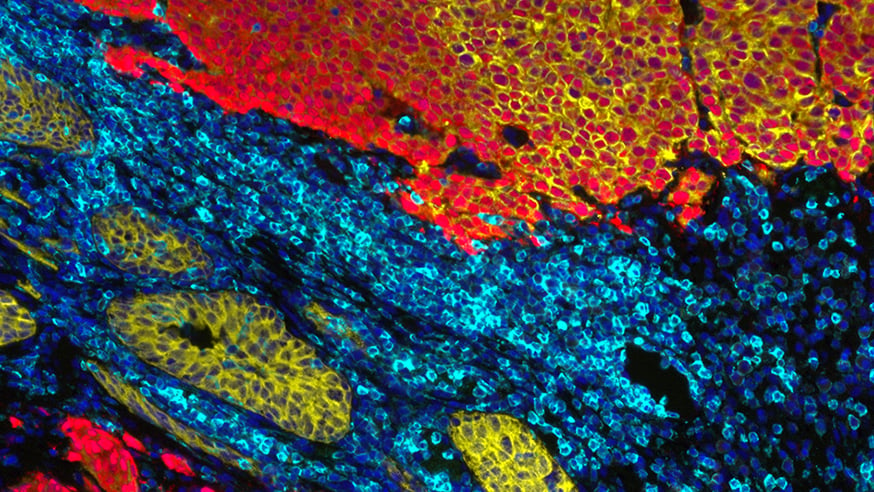
Immunofluorescence staining showing extension of prostatic adenocarcinoma into the bladder wall in a castration resistant prostate cancer patient
A protein linked to prostate cancer could predict which men are likely to develop resistance to current treatments and die earlier, a new study reveals.
Scientists at The Institute of Cancer Research, London, measured levels of a protein called AR-V7, which has been linked with advanced prostate cancer, from 37 men with the disease.
They found that advanced prostate cancers had higher levels of AR-V7 protein in their cells, and men with these higher protein levels often developed resistance to current prostate cancer treatments.
Testing prostate cancer patients for AR-V7 could therefore identify men likely to develop resistance to current treatment strategies, and who could benefit from other forms of treatment.
Higher AR-V7 levels were also linked to worse outcomes for advanced prostate cancer patients. Men with the lowest recorded AR-V7 levels survived on average twice as long as patients whose tumours displayed high AR-V7 levels.
The study was published in the journal European Urology and received funding from Prostate Cancer UK, Movember, the Prostate Cancer Foundation, the Department of Defence and the Medical Research Council with support from The National Institute for Health Research Biomedical Research Centre at The Royal Marsden NHS Foundation Trust and the ICR.
Measurable progression
Prostate cancer is the most common cancer diagnosed in men and kills over 10,000 men in the UK each year. Advanced prostate cancer is incurable, but despite modern targeted treatments extending patients’ lives by many months, resistance to therapies is common.
Therapeutic strategies for advanced prostate cancer block a signalling pathway called the androgen receptor, preventing the male hormone androgen from aiding tumour growth. But researchers have found that the AR-V7 protein could help cancer cells to continue androgen signalling in spite of drugs designed to block it, causing the treatments to fail.
Scientists from the ICR and The Royal Marsden took tumour samples from 37 men with prostate cancer and measured levels of the protein AR-V7 during treatment.
The researchers found that in 79% of patients studied, AR-V7 increased significantly as their disease progressed to an advanced stage.
AR-V7 reached its highest level after treatment with targeted cancer drugs, compared with levels in samples taken before treatment.
Overcoming resistance
Patients whose tumours displayed high levels of AR-V7 survived an average of 7.1 months, compared with 15.6 months for patients with the lowest levels of AR-V7 expression.
Professor Johann de Bono, Head of the ICR’s Division of Clinical Studies and Honorary Consultant at The Royal Marsden, said: “Drugs that target androgen receptor signalling have helped patients with advanced prostate cancer survive for longer but some men develop resistance to these treatments, so we need ways to identify these patients to improve outcomes.
“Our research shows that a protein called AR-V7 is linked to emerging drug resistance in advanced prostate cancer and could indicate worse prognosis. AR-V7 is currently not targetable with available therapies, but treatments that target AR-V7 and overcome these mechanisms of resistance have the potential to improve further the survival of patients with advanced prostate cancer.”